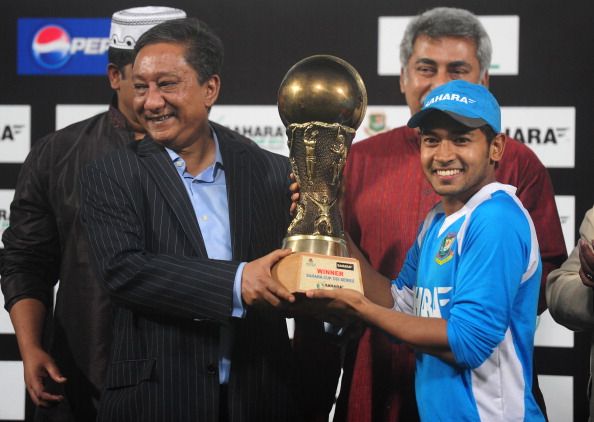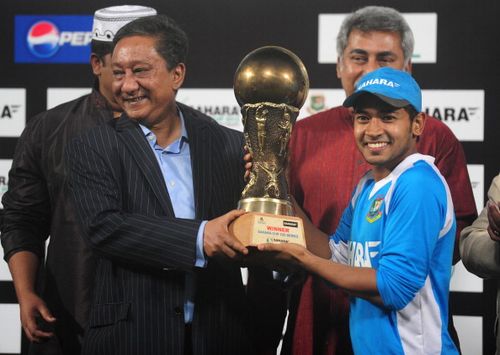
What have you just done to Bangladesh cricket, Nazmul Hassan Papon?

Bangladesh Cricket Board president Nazmul Hassan Papon (L)
The world of cricket is divided. Cricket’s most powerful and richest boards – BCCI, CA and ECB – have unleashed a list of proposals which can be nothing but unacceptable from whichever way you look at it. The enraged lesser cricket boards immediately raised their voice against the suggested proposals in the recently concluded International Cricket Council meeting in Dubai on January 28 and 29. Along with the Pakistan Cricket Board (PCB), the Cricket South Africa (CSA) and the Sri Lankan Cricket Board (SLC), the Bangladesh Cricket Board (BCB) raised its voice against the Big Three, too.
Though the Bangladesh Cricket Board chief Nazmul Hassan Papon initially decided to support the Big Three, strong protests from the die hard cricket fans of Bangladesh cricket, who took the streets to express their angst, and the cricket critics of the country forced Papon to take a stance against the proposed ICC revamp.
Bangladesh’s major concern with the proposition was the two-tier system in Test cricket, which will put the country’s Test status at risk. If it comes into existence, Bangladesh, along with Zimbabwe, have to play the Intercontinental Cup against the associate nations for becoming eligible to play a Test match against the top eight Test teams.
Hence, during the ICC meeting, Papon protested against the two-tier system, and in response, the ICC sorted out the issue by setting up a new clause, which says: “There will be an opportunity for all Members to play all formats of cricket on merit, with participation based on meritocracy; no immunity to any country, and no change to membership status.”
On hearing the assurance, the voice of Nazmul Hassan Papon became low-pitched, and he decided not to protest further more and shook hands with the Big Three. His main aim was to save Bangladesh’s Test status, and he had managed to achieve that. The other proposals did not bother him, and the gloomy future of world cricket in the near future is not all his headache afterall.
Surely, Bangladesh is not in a position in world cricket to think deeply about the other critical structural and financial issues. But shouldn’t the thought regarding the betterment of cricket have come to mind? Isn’t Bangladesh a part of world cricket?
With Papon accepting the revised proposals, the Big Three are now just one vote away from the number required to push through the constitutional amendments in order to fulfill their greed. Has the Bangladesh Cricket Board chief done the right thing by deciding to support the Big Three?
Papon arrived at the Shahjalal International Airport in Dhaka and spoke in a manner as if he had won a big battle. Nazmul Hassan said: “We will be in a better position than others. We haven’t been to India in 14 years. We will go there to play Tests, they will come here too. We will go to England; Australia will come here.” The chief received a big round of applause as soon as he finished the short speech.
Has Papon been given any written assurance? If not, are verbal promises worth it? One must not forget how the BCCI has been dealing with the PCB regarding a bilateral Indo-Pak series in a neutral venue. Someday, it could be Bangladesh at the receiving end.
Again, whether the teams like England, Australia and India will be interested to play against Bangladesh amid their busy schedule remains a moot question. Bangladesh should sign a written agreement regarding the tour of India, England and Australia. Verbal promises have no values at all.
Moreover, before signing the Members Participation Agreements(MPA), did Papon read the proposal carefully? What does that ‘all Members’ in the readjusted proposal mean? Does that include only the members from the Test world or the associate members also? It’s not clear at all.
Then comes the “participation based on meritocracy.” What sort of meritocracy? Al-Amin, a sports journalist of Bangladeshi newspaper ‘Daily Star’ has explained this ‘meritocracy’ in a better manner: “Interestingly, the ICC has already adopted and implemented the concept of ‘meritocracy’ in the shorter versions. And this is why Bangladesh and Zimbabwe are playing the qualifying phase in the coming ICC T20 World Cup.”
Then, “no immunity to any country.” What does this ‘immunity’ indicate? Al-Amin has explained: “If we assume that Test cricket will be played in the future in the way that it is played now, then the question of relegation should not exist. But the words ‘no immunity to any country’ would only exist if there was the possibility of relegation.”
A quick look at the readjusted proposal might create a sense of ecstasy and make us all think that Bangladesh’s Test status is secured, but there is much more lying beneath it. I think Papon should have asked for more time to think about the proposal. Bangladeshis are known as fighters and don’t get bogged down under any pressure, but I am afraid the chief has just done that.
Instead of siding with the Big Three, Nazmul Hassan Papon should have remained alongside Pakistan, South Africa and Sri Lanka. If further needed, Papon and the others who are protesting could seek the help of the Court of Arbitration for Sport (CAS) and question the legality of the Big Three’s revamp plan. But, if Nazmul Hassan signs the MPA on February 8, will he be able to do that then? There’s still time to rethink.
If the Big Three’s promises to BCB do get implemented, money will flow in Bangladesh cricket as the country will get more opportunities to play against India, England and Australia. The promises of cunning minds can hardly be trusted, though. Deep down, I also feel that they are short term benefits. The Bangladeshi cricket fans might cheer, but as an ardent follower of this glorious game of uncertainties, I am concerned about the well-being of world cricket.